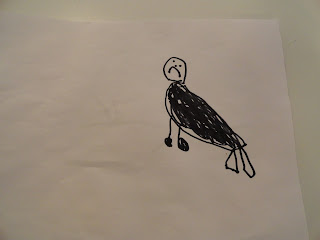I'm not sure what sparked his interest in this topic, but as a result my husband hunted down a couple of shows to stream on Netflix. Monster Quest and Is It Real both examine evidence for the existence of such terrifying and mysterious creatures as Sasquatch, the Loch Ness Monster and the Chupacabra.
I am astonished by the amount of learning that has come out of watching these shows. Henry has expanded his knowledge of folklore, geography (marking the states on a map where there have been Big Foot sitings), and the scientific method. In the process he's also done a good bit of practice drawing and writing.
He researched on YouTube to find a video showing the process for creating a plaster cast of animal tracks. He practiced measuring and mixing and multiplication to create enough plaster to pour into the print he discovered.
Some non-standard unit measurement for the preschooler.
Working to get the cast out.
This was my favorite part. Our neighbor is a biologist and Henry thought he might be able to examine the specimen. He started to write the note and had me finish it. It reads: "To Brian, From Henry. Please take to lab. If your lab doesn't deal with Big Foot evidence, please return to me and I will send to New York University. Thank you."
The neighbors got a huge kick out of this. Brian did return the specimen noting that his lab generally deals with really tiny things, not big ones.
The project has also involved a lot of writing and drawing. Below is his recording of what he planned to do. "We spotted a big hairy animal. What was it? We will send it to Jack. Signed Monster Quest Member, Henry." (Jack is his best buddy.)
He happened to have captured a picture of the creature on a hidden camera.
This is the unknown specimen. (Potentially Big Foot)
He then compared the unknown specimen to known primates with similar characteristics.
Could it have been a gorilla?
Could it have been a gorilla?
Perhaps it was a baboon?
Or maybe an orangutan?
Or not a primate at all, but a bear?
He determined that it most closely resembled an orangutan but that we could not rule out the possibility that he did in fact discover a new species.
















Jess this is awesome and inspiring. I love the way kids find what they need and the direction they want to take it.
ReplyDelete